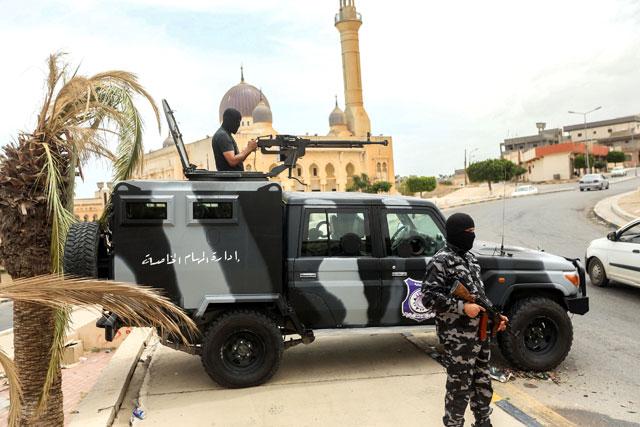- International News
- Mon-2020-06-15 | 03:57 pm

Turkey, supported by its main regional ally Qatar, backs the UN-recognised Government of National Accord (GNA) in Tripoli in the conflict against the forces of eastern Libya strongman Khalifa Haftar.
France, despite public denials, has long been suspected of favouring Haftar, who has the backing of Egypt, Russia and the United Arab Emirates.
Paris is angered by an "even more aggressive and insistent stance from Turkey, with seven Turkish ships deployed off the Libyan coast and violations of the arms embargo", a senior presidential official said.
"The Turks are behaving in an unacceptable manner and are exploiting NATO. France cannot just stand by," added the official, who asked not to be named.
French President Emmanuel Macron has already held talks on the issue this week with US leader Donald Trump, and "exchanges will take place in the weeks to come on this subject with NATO partners", the official said.
The comments came after a Turkish warship on Wednesday prevented a new EU naval mission enforcing the Libya arms embargo from checking a suspect freighter off the Libyan coast.
Turkey has sent Syrian fighters, military advisers and drones in support of the GNA, in a deployment which has changed the course of the conflict, with Haftar’s forces enduring a string of defeats.
Meanwhile, Pope Francis on Sunday urged international bodies as well as political and military leaders to stop the violence in Libya and to also end the plight of migrants, refugees and others trapped there.
Speaking from a window at his Vatican residence on St Peter’s Square, the Pope told the faithful he included his concerns in his prayers over recent days.
"I am following the dramatic situation in Libya with great apprehension,” he said.
"I urge international bodies and those who have political and military responsibilities to recommence with conviction and resolve the search for a path towards an end to the violence, leading to peace, stability and unity in the country.”
The Pope also said he prayed for "the thousands of migrants, refugees, asylum seekers and internally displaced persons in Libya”.
Alluding apparently to the coronavirus pandemic also hitting Libya, he said "the health situation has aggravated the already precarious conditions in which they find themselves, making them more vulnerable to forms of exploitation and violence”.
He added "there is cruelty”, urging the international community to take "their plight to heart” and find ways and means "to provide them with the protection they need, a dignified condition and a future of hope.”













